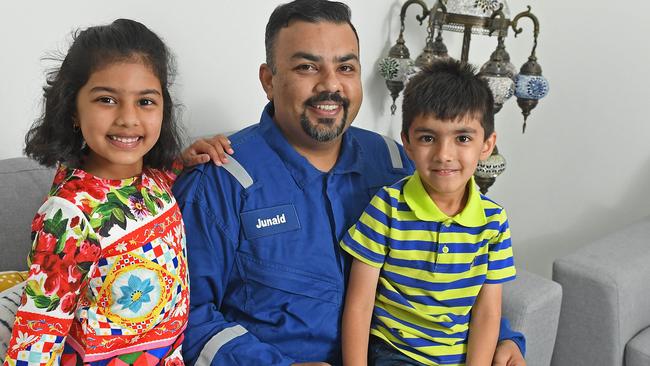Top professions where Australians are using investment accounts to make more cash
None of these Australians work in finance – but they are some of the nation’s best money-makers this year. See how much they’re earning.
National
Don't miss out on the headlines from National. Followed categories will be added to My News.
Exclusive: There is something to be said about being older and wiser — retirees can lay claim to being the best money makers of 2020.
New data obtained by News Corp Australia from online investment service Stockspot found those enjoying their golden years finished first ahead of engineers, transport, health workers and homemakers in the year’s investment savings stakes.
Far from deterred by the coronavirus, savvy retirees recorded the highest average portfolio balance at $77,737.
They were followed by transport workers who had an average of $43,597 and homemakers in third place with $40,912.
Others who invested include healthcare workers with an average of $31,864, and engineers with $28,598.
Stockspot Founder and CEO Chris Brycki said across Australia, its 5000 clients invested $25 million from the first quarter of the year.
Overall, their portfolios grew by $100 million in 2020 through a combination of their own regular top-ups and market growth despite the COVID-19 pandemic.
Interestingly finance workers came in eighth with an average amount of $23,084 followed by accountants with $20,729.

The Northern Territory and Tasmania had overall returns on their investment accounts of 9.56 per cent and 8.09 per cent.
“Perhaps being so far removed from the chaos of Victoria and the rest of the world gave them time to focus on their finances and invest when the market was down,” Mr Brycki said.
South Australia was the most successful of the larger states earning 5.94 per cent on average this year.
“Unlike NSW, the number of new South Australian clients was consistent throughout the year – possibly a reflection of a shorter lockdown and less severe social restrictions,” Mr Brycki said.

Returns for Queenslanders who invested at the start of the year were 4.91 per cent.
“We have more clients in Queensland working in tourism and travel related industries, so that might have made it harder for them to keep investing when markets were low,” Mr Brycki said.
In NSW, returns for those who invested at the start of the year was 4.98 per cent.
Mr Brycki said they saw the number of new investors spike after the lockdown period was lifted.
“That’s a great result after the share market was initially down 35 per cent in the first quarter and comes after 15-20 per cent returns for investors in 2019.”
Victorians’ returns were the lowest compared to all other states at 4.61 per cent.
“Due to the incredibly tough year Victorians had, this was the group also most likely to withdraw funds from their investment account to cover living expenses as the year wore on,” Mr Brycki said.
It comes as Australian Bureau of Statistics (ABS) figures released earlier this month showed total household wealth increased 1.7 per cent to a record high of $11.351 billion.
Increases in residential assets (1.2 per cent), deposits (5.4 per cent), and superannuation balances (1.1 per cent) were the main contributors to the growth.
Specialist Adviser and Director of Envision Financial Luke Smith told News Corp Australia the data showed “smart people were saving money”.

“A lot of clients are cashed up because discretionary spending has been taken from them and COVID has meant they don’t need money for things like petrol or parking,” Mr Smith said.
“Your ‘average secure employee’ would have saved a lot of this money, hopefully it went into their house.”
He also said the assumption that lawyers and finance workers are better at saving or investing is “dangerous”.
“Those in finance have worked hard this year so have lawyers, but these workers have steady incomes, some are also backed by unions who won’t let them go with a pay cut.”
Mr Smith said those looking at opening an investment account must consider whose name it goes into and the tax implications, how much money you have to work with, how long you’ll invest for and make sure you understand the risk profile.
“Have a regular, automated account too, the less engaged you are the more consistent it’ll be,” he said.
“People also need to reward themselves because people stay more engaged, 12 months is a long time to set and achieve a (financial) goal.”

‘I’M ON TRACK TO MAKE $25,000’
Engineer Junaid Ahmed started an investment account in February and believes he is close to reaching his target of $25,000 by the same time next year.
The father-of-two, 35, from Lightsview in South Australia, told News Corp he opened an investment account after trying options of cryptocurrency and buying shares.
“I’m at a point in my life where I need to start saving and setting up an account like this is risk averse,” he said.
“At the time the pandemic hit, share prices were lower and it was a good entry point for me.
“I also realised the other options were not working.
“I started off with a monthly target of $1000 and added more money where I could … my bigger dream is to retire early and the only way to do that is save now.”
Mr Ahmed said it was very simple to manage with debits from his account, and he could be flexible with his monthly top-ups.
“I see a lot of my friends in my age group doing the same thing, you’re in the peak of your career and it helps on top of having superannuation also there when you get to retirement age,” he said.
“By the end of the month, you can see where you stand and use the app on your phone to change things … you can also withdraw the funds at anytime, that’s also the beauty of it.”
Originally published as Top professions where Australians are using investment accounts to make more cash





